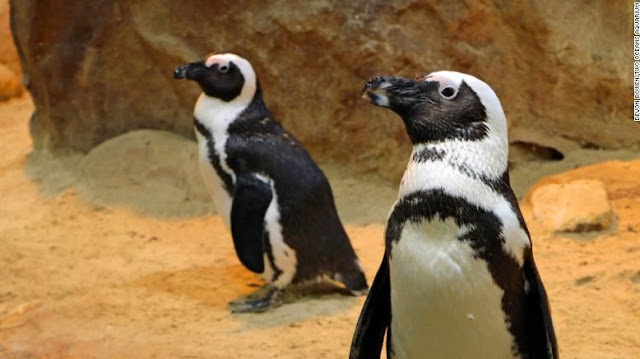African penguins are between the smaller breeds, known for their irregular markings and loud voices.
The species is in addition in sharp decline, from a population of more than one mlln. at the starting of the 20th century to just 55,000 in 2010 - when they were declared endangered.
South African bioscientist Patrick Siyambulela Mafunda learned of the birds' plight while researching alternatives for his PhD at the University of the Western Cape (UWC). He debated the drastic challenges of conservation with supervisors and arrived at a novel approach: In-vitro fertilization (IVF).
"What pushed me was knowing this was the only African penguin species we have," tells Mafunda. "Preserving a genetic pool may be vital."
There was another incentive. While similar experiments had been conducted with other species, Mafunda knew of no other effort to artificially inseminate an African penguin. He may be the first.
Massage technique
The exploration proved labor-intensive and indispensable the scientist and his collaborators to get their hands dirty.
The first stage was to study the reproductive organs of dead birds to create an understanding of their biological cycles.
Next came the more challenging assignment of extracting sperm from live penguins. Mufunda had developed an abdominal massage method for this ambition, to be conducted all through breeding season when the penguins were at their most virile.
This delicate activity was to be performed by staff at Cape Town's Two Oceans Aquarium.
"The handlers work with the penguins daily, so the penguins react better to them," tells Mafunda. "They aren't known for being friendly."
The process was difficult by the penguins' desires. If the birds had earlier found a partner to mate with, they would not play ball with human handlers.
But through several breeding seasons, Mafunda was able to assemble sufficient sperm samples, which he rushed to the UWC labs for preservation and quality research.
He cross-checked the samples contrary blood and fecal tissue to create up a detailed image of the birds' hormonal phases.
Live tests
With an unprecedented collection of samples now at his disposal, Mafunda's next target objective is fertilization.
"The next stage is to develop a biobank for African penguin sperm that we know is good quality," tells Mafunda. "That will enable us to do the IVF and generate (fertilized) eggs."
There are two alternatives from that point. The eggs may be incubated in lab ovens for 30-40 days until they hatch, or Mafunda could go the more ambitious route of implanting the egg into a living penguin and enable nature to perform the rest. At this point, he is more focused on the former possibility.
The bioscientist is hoping for new partnerships with academic and conservation institutions to offer funding and support that will enable him to begin again his exploration and deliver the proof of concept: the first lab-cultivated living African penguin.
If this could be secured, Mafunda is confident his work can play a part in supporting to reverse the decline of the species.
"I believe this could be a solution," he tells. "There are multiple strategies indispensable for conservation, we can't rely on just one. This is one of the tactics I believe we must use."
In the wild
Mafunda's study shows promise but will need development to be applied on a large sufficient scale to affect conservation efforts, in keeping with Professor Antoinette Kotze, manager of exploration and scientific services at the National Zoological Gardens of South Africa (NZG).
"He has shown it can work to extract semen from penguins, which is quite a complicated process," tells Kotze, who in addition served as a supervisor on Mafunda's project.
"Whether it can work in the wild i am not sure. The process of analyzing and preservation of sperm is not a trouble, but in the wild there is no clear mode of collecting sperm...I think the following step is to perfect a method of collection from wild penguins."
Christina Hagen, a conservationist at Birdlife South Africa, believes the exploration may have potential but is not an instantaneous conservation priority.
"There is yet an African penguin population in the wild that will be able to breed effectively given the proper conditions," tells Hagen. "The sperm bank could come into play if the population drops to undoubtedly low levels."
"The problem facing the penguins is a lack of food such as sardines and anchovies. There are real setbacks with availability of their diet...that has in our view caused an enormous decline. Until we address that, placing more penguins out there will not solve the trouble."
However, Hagen identifies that IVF methods are a growth area within conservation - they have been used with threatened species this includes bison and rhino - and suggests they might play a helpful role in emergencies.
"With endangered species, we should try as much as we can that won't damage animals or species so we should look at these ideas," she tells. "Also it is good to create these methods in







0 komentar:
Posting Komentar